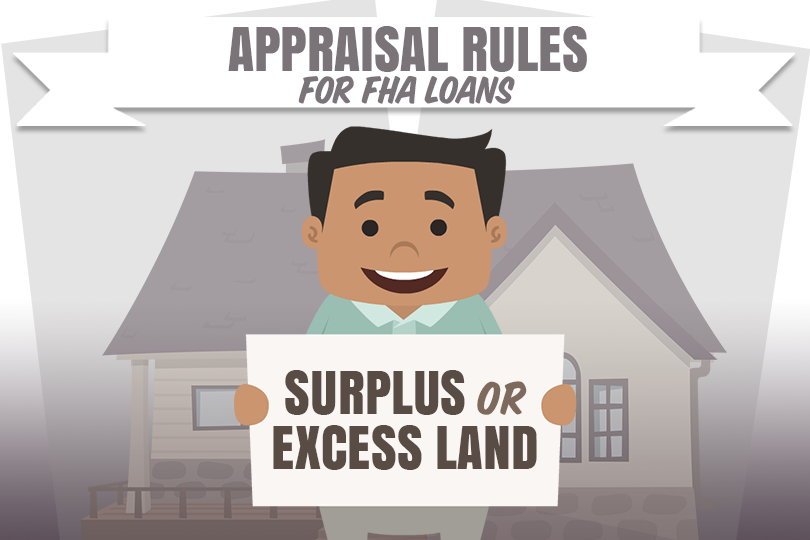FHA Loans, Appraisals, and Excess Land
May 3, 2023
FHA loan rules in HUD 4000.1 discuss appraisal issues related to surplus land or excess land--how does this issue affect the valuation of the home?
The Definition of Surplus or Excess Land
The definition of and rules for surplus/excess land can be found in HUD 4000.1, which says, "Excess Land refers to land that is not needed to serve or support the existing improvement. The highest and best use of the Excess Land may or may not be the same as the highest and best use of the improved parcel. Excess Land may have the potential to be sold separately."
The terms "excess" and "surplus" are NOT interchangeable. Surplus land is described in HUD 4000.1 as, “...land that is not currently needed to support the existing improvement but cannot be separated from the Property and sold off."
Furthermore, surplus Land does not have an independent “highest and best” use. It may or may not “contribute to the value of the improved parcels" according to HUD 4000.1.
FHA Appraisal Guidelines for Surplus/Excess Land
The FHA loan rules for surplus/excess land include a requirement that the FHA appraiser includes the “highest and best” use of the property, “...to support the Appraiser’s conclusion of the existence of Excess Land. The Appraiser must include Surplus Land in the valuation."
FHA loan rules and that in cases where there are “two or more legally conforming platted lots under one legal description and ownership”, and the second vacant lot can be divided /developed “as a separate parcel where such a division will not result in a non-conformity in zoning regulations for the remaining improved lot, the second vacant lot is Excess Land."
The value of the second lot would be excluded from the “final value conclusion of the appraisal”. The appraiser must value the principal site and improvements, “under a hypothetical condition".
There may also be state law and/or lender standards that factor into these procedures. Remember that FHA loan rules are not the only guidelines that will inform the lender’s choices in certain areas. Lender standards and state law will also play an important role.
There are many situations where surplus or excess land might be a factor. If you are not sure how much land is considered “excess” or “surplus”, ask a lender what is typical for the local area and what is considered outside the norm. Your experience may vary; it’s not safe to assume that what is considered “surplus” in one housing market might be considered more typical in another.
------------------------------
RELATED VIDEOS:
What Is an FHA Loan?
Using an FHA Loan Calculator
Meeting FHA Loan Guidelines Improves Your Chances

FHA Loan Articles
March 29, 2021The FHA helps first-time and low-income homebuyers by having lower down payment requirements for its borrowers. Despite this lower credit eligibility criteria set by FHA, it is important to remember that FHA-approved lenders can set their own requirements
March 24, 2021One of the major arguments people have for renting instead of buying is the large upfront cost of a down payment. Depending on the type of loan program you apply and are approved for, this could mean anything between 3.5% and 20% percent of your purchase price.
March 21, 2021The two basic types of home loans are fixed rate and adjustable-rate mortgages. The mortgage market offers many other options to homebuyers, but these two are the most common, and the first pair from which to pick.
March 15, 2021A key step in the mortgage process is the home appraisal. In the case of home purchase or refinance, this is a task that is almost always required by the lender, and it is important that potential homebuyers understand what, how, and why of a home appraisal.
March 10, 2021The renewable energy industry is growing more and more every year, and many homeowners have implemented energy-efficient strategies in their homes. This can include programmable thermostats, solar panels, new insulation in the attic, etc.







